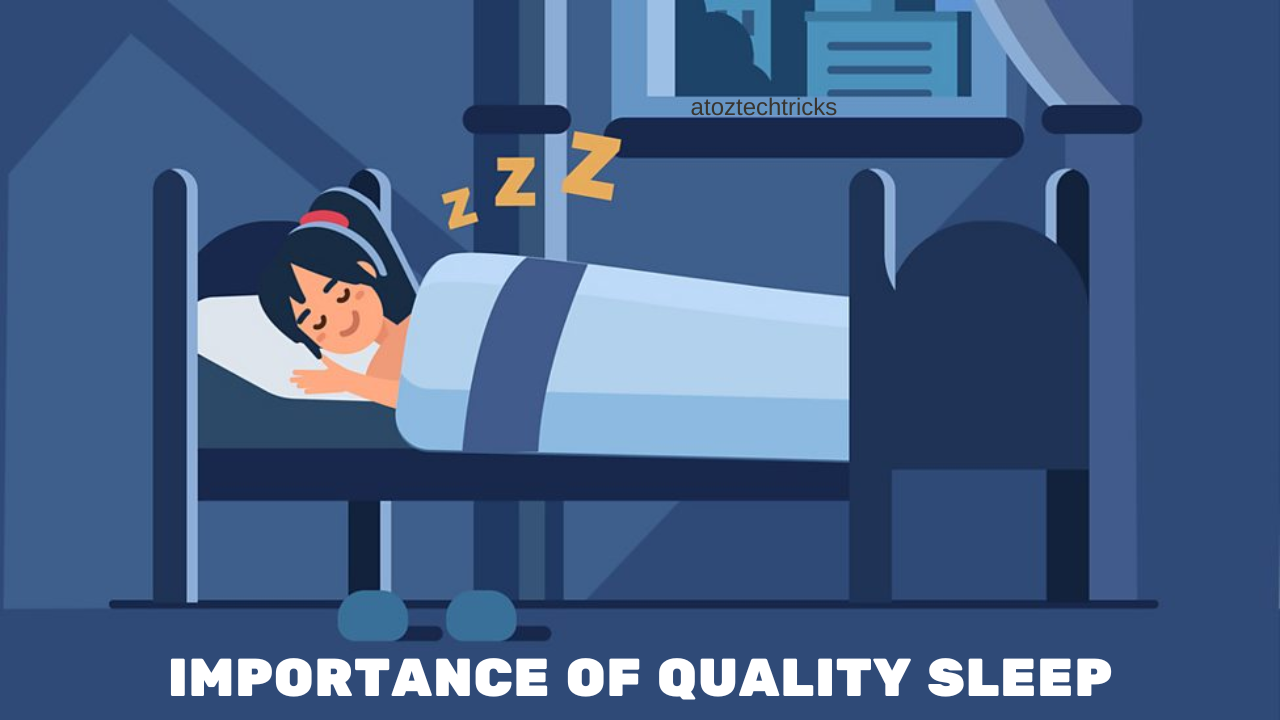Understanding the Importance of Quality Sleep
In today’s fast-paced world, the emphasis on productivity and performance often overshadows one of the most fundamental components of good health: quality sleep. Despite its critical importance, sleep is frequently undervalued, with many people sacrificing it in favour of work, social engagements, or entertainment. However, understanding the importance of quality sleep is essential for maintaining physical health, mental well-being, and overall quality of life. This comprehensive guide delves into the significance of quality sleep, exploring its impact on various aspects of health and providing practical tips for improving sleep quality.
The Science of Sleep
Sleep Stages and Cycles
Sleep is a complex biological process characterized by different stages that cycle throughout the night. The sleep cycle consists of two main types: Non-Rapid Eye Movement (NREM) sleep and Rapid Eye Movement (REM) sleep.
- NREM Sleep: This stage is divided into three phases:
- N1 (Light Sleep): This is the transition phase between wakefulness and sleep, where you can be easily awakened.
- N2 (Light Sleep): The body begins to relax further, and brain waves slow down. This stage accounts for the majority of our sleep time.
- N3 (Deep Sleep): Also known as slow-wave sleep, this is the most restorative stage where the body repairs tissues, builds bone and muscle and strengthens the immune system.
- REM Sleep: Occurring after NREM sleep, REM sleep is characterized by rapid eye movements, increased brain activity, and vivid dreaming. It is crucial for cognitive functions such as memory consolidation, learning, and emotional regulation.
Sleep Architecture
The sleep cycle typically lasts about 90 minutes, with an average of 4-6 cycles occurring during a full night’s sleep. The proportions of NREM and REM sleep vary throughout the night, with longer periods of REM sleep occurring towards the morning. Disruptions to this architecture can lead to insufficient restorative sleep, affecting overall health.
The Impact of Quality Sleep on Health
Physical Health
- Immune Function: Quality sleep is essential for a robust immune system. During deep sleep, the body produces cytokines, proteins that help regulate the immune response. Chronic sleep deprivation can weaken immune defences, making individuals more susceptible to infections and illnesses.
- Cardiovascular Health: Adequate sleep is linked to lower risks of cardiovascular diseases such as hypertension, heart attack, and stroke. Poor sleep can lead to increased blood pressure and inflammation, contributing to cardiovascular problems.
- Weight Management: Sleep affects hormones that regulate hunger and appetite. Lack of sleep can lead to increased levels of ghrelin (hunger hormone) and decreased levels of leptin (satiety hormone), resulting in weight gain and obesity. Quality sleep helps maintain a healthy balance of these hormones.
- Metabolism and Blood Sugar Regulation: Quality sleep plays a role in regulating glucose metabolism and insulin sensitivity. Sleep deprivation can impair glucose tolerance and increase the risk of developing type 2 diabetes.
Mental Health
- Emotional Regulation: Sleep has a significant impact on mood and emotional stability. Insufficient sleep can lead to irritability, mood swings, and heightened stress levels. Conversely, quality sleep helps regulate emotions and improve resilience to stress.
- Cognitive Function: Sleep is crucial for cognitive processes such as attention, memory, and problem-solving. REM sleep, in particular, is involved in memory consolidation and learning. Poor sleep quality can impair cognitive performance and increase the risk of developing neurodegenerative conditions like Alzheimer’s disease.
- Mental Health Disorders: Chronic sleep problems are linked to various mental health conditions, including depression and anxiety. Addressing sleep issues can improve symptoms and overall mental health.
Quality of Life
- Productivity and Performance: Adequate sleep enhances cognitive function, creativity, and problem-solving skills, leading to improved performance in work and daily activities. Sleep deprivation can result in decreased productivity, poor decision-making, and an increased likelihood of errors.
- Social Relationships: Quality sleep affects interpersonal relationships by influencing mood and emotional responses. Better sleep promotes positive social interactions and reduces the likelihood of conflicts or misunderstandings.
- Safety: Sleep deprivation increases the risk of accidents and injuries. Lack of sleep impairs reaction time and judgment, making activities such as driving more dangerous.

Strategies for Improving Sleep Quality
Establish a Consistent Sleep Routine
- Regular Sleep Schedule: Going to bed and waking up at the same time every day helps regulate your internal clock, making it easier to fall asleep and wake up. Consistency reinforces your body’s natural sleep-wake cycle.
- Create a Relaxing Bedtime Routine: Engaging in calming activities before bed, such as reading, taking a warm bath, or practising relaxation techniques, signals to your body that it’s time to wind down.
Optimize Your Sleep Environment
- Comfortable Bedding: Invest in a comfortable mattress and pillows that support your sleeping position. Proper bedding can prevent discomfort and improve sleep quality.
- Optimal Room Temperature: Maintain a cool, comfortable temperature in your bedroom. The ideal temperature for sleep is generally between 60-67°F (15-19°C).
- Dark and Quiet Environment: Minimize exposure to light and noise in your sleep environment. Use blackout curtains, earplugs, or white noise machines if necessary to create a conducive sleep environment.
Limit Exposure to Stimulants
- Caffeine and Nicotine: Avoid consuming caffeine and nicotine in the hours leading up to bedtime, as they can interfere with your ability to fall asleep.
- Alcohol: While alcohol may initially make you drowsy, it can disrupt sleep patterns and reduce the quality of sleep. Limit alcohol intake, especially close to bedtime.
Manage Stress and Anxiety
- Relaxation Techniques: Practice relaxation techniques such as deep breathing, progressive muscle relaxation, or meditation to manage stress and promote better sleep.
- Mindfulness and Cognitive Behavioral Therapy (CBT): Techniques like mindfulness and CBT for insomnia (CBT-I) can help address the underlying causes of sleep problems and improve sleep quality.
Monitor Your Sleep Patterns
- Sleep Tracking: Utilize sleep trackers or apps to monitor your sleep patterns and identify potential issues. Tracking can provide insights into factors affecting your sleep and help you make necessary adjustments.
- Seek Professional Help: If you experience persistent sleep problems or suspect a sleep disorder, consult a healthcare professional or sleep specialist for evaluation and treatment.
Common Sleep Disorders
Insomnia
Insomnia is characterized by difficulty falling asleep, staying asleep, or waking up too early. It can be caused by various factors, including stress, anxiety, or underlying medical conditions. Effective treatments may include lifestyle changes, cognitive-behavioral therapy, or medications.
Sleep Apnea
Sleep apnea is a sleep disorder marked by repeated interruptions in breathing during sleep. It can lead to excessive daytime sleepiness and increase the risk of cardiovascular problems. Treatment options may include lifestyle changes, continuous positive airway pressure (CPAP) therapy, or surgical interventions.
Restless Legs Syndrome (RLS)
RLS is a condition characterized by uncomfortable sensations in the legs and an uncontrollable urge to move them, often disrupting sleep. Management strategies may include lifestyle modifications, medications, or addressing underlying health conditions.

Narcolepsy
Narcolepsy is a neurological disorder characterized by excessive daytime sleepiness and sudden episodes of muscle weakness or paralysis. Treatment typically involves a combination of medication and lifestyle adjustments.
Understanding the importance of quality sleep is crucial for maintaining overall health and well-being. Quality sleep affects physical health, mental health, and daily functioning. By recognizing the impact of sleep on various aspects of life and implementing strategies to improve sleep quality, individuals can enhance their health, productivity, and quality of life. Prioritizing sleep and adopting healthy sleep habits can lead to a more fulfilling and balanced life, underscoring the need to value and invest in this essential aspect of health.
Incorporating Rest and Relaxation into Daily Life: A Comprehensive Guide




Post Comment